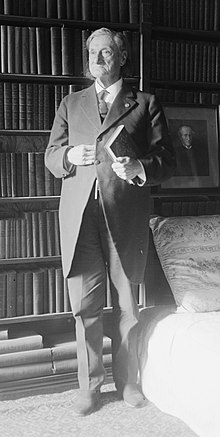Roger A. Pryor
| Roger Atkinson Pryor | |
|---|---|
 |
|
| Member of the Confederate States House of Representatives from Virginia | |
|
In office February 18, 1862 – April 5, 1862 |
|
| Preceded by | Position established |
| Succeeded by | Charles F. Collier |
| Delegate from Virginia to the Provisional Confederate Congress | |
|
In office July 20, 1861 – February 17, 1862 |
|
| Preceded by | Position established |
| Succeeded by | Position abolished |
| Member of the U.S. House of Representatives from Virginia's 4th District | |
|
In office December 7, 1859 – March 3, 1861 |
|
| Preceded by | William O. Goode |
| Succeeded by | George W. Booker |
| Personal details | |
| Born |
July 19, 1828 Petersburg, Virginia, U.S. |
| Died | March 14, 1919 (aged 90) New York City, New York, U.S. |
| Political party | Democratic |
| Alma mater |
Hampden–Sydney College University of Virginia |
| Profession | journalist, lawyer, judge |
| Military service | |
| Allegiance |
|
| Service/branch |
|
| Years of service | 1862–1864 |
| Rank |
Private of Cavalry |
| Battles/wars | |
Roger Atkinson Pryor (July 19, 1828 – March 14, 1919) was a Virginian newspaper editor and politician who became known for his fiery oratory in favor of secession; he was elected both to national and Confederate office, and served as a general for the Confederate Army during the American Civil War. In 1865 he moved to New York City to remake his life, and in 1868 brought up his family. He was among a number of influential southerners in the North who became known as "Confederate carpetbaggers."
He became a law partner with Benjamin F. Butler (based in Boston), noted in the South as a hated Union general during the war. Their partnership was financially successful, and Pryor became active in the Democratic Party in the North. In 1877 he was chosen to give a Decoration Day address, in which, according to one interpretation, he vilified Reconstruction and promoted the Lost Cause, while reconciling the noble soldiers as victims of politicians. In 1890 he joined the Sons of the American Revolution, one of the new heritage societies that was created following celebration of the United States Centennial.
He was appointed as judge of the New York Court of Common Pleas from 1890 to 1894, and justice of the New York Supreme Court from 1894 to his retirement in 1899. On April 10, 1912, he was appointed official referee by the appellate division of the state Supreme Court, where he served until his death.
He and his wife Sara Agnes Rice Pryor, also a Virginian, had seven children together, the last born in 1868. Active in founding several heritage societies, she organized fundraising for historic preservation. She was a writer and had several works: histories, memoirs, and novels, published by the Macmillan Company in the first decade of the twentieth century. Her memoirs have been important sources for historians doing research on southern society during and after the Civil War.
...
Wikipedia
